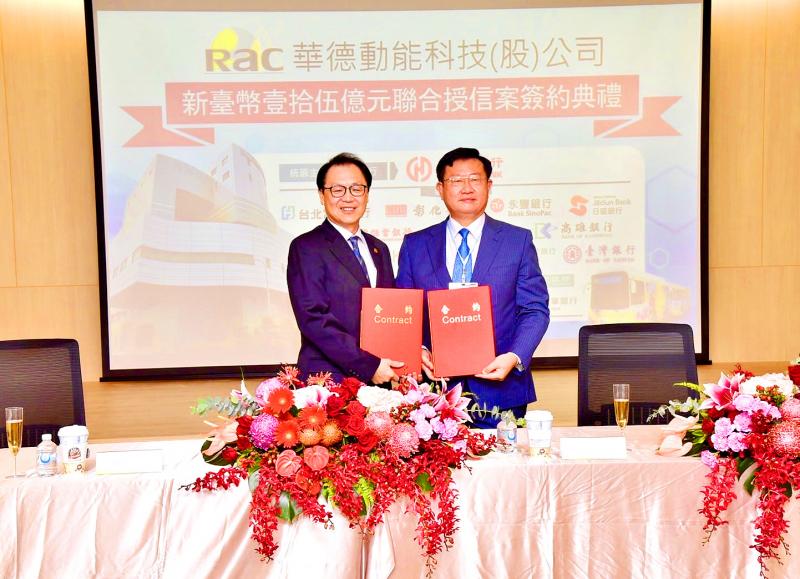RAC Electric Vehicles Inc (華德動能科技) has secured a NT$1.5 billion (US$50.2 million) syndicated loan to fund its capacity expansion after receiving significant orders from customers, the electric bus manufacturer said yesterday.
Hua Nan Commercial Bank (華南銀行) acted as the lead arranger of the syndicated loan, with 15 other banks participating, RAC said in a statement.
The lenders have oversubscribed to the loan by more than 100 percent, it said.

Photo courtesy of Hua Nan Commercial Bank
RAC has won bids to supply 169 new electric buses to the nation’s major bus operators, including Capital Bus Co (首都客運), Danan Bus Co (大南客運) and Geya Bus Transport Co (巨業交通), through a government pilot program. The operators run services in Taipei, New Taipei City, Taichung and Kaohsiung.
Winning bidders are to receive a subsidy of up to NT$10 million per vehicle. The program aims to boost production of locally made electric buses to 16,000 units a year by 2030.
RAC plans to ship 105 electric buses this year, most of which would be delivered in the second half, it said.
The Taoyuan-based company last year delivered 33 electric buses to local bus operators, such as San Chung Bus Co (三重客運), it added.
To cope with rising customer demand, RAC’s parent company, Mobiletron Electronics Co (車王電子), has spent NT$2.5 billion to build a factory in Taichung for RAC to expand its capacity. The new factory has an installed capacity of 1,700 electric buses and 6,000 automobile chassis a year.
The plant is to start operations next quarter, RAC said.
Mobiletron owns a 54.64 percent stake in RAC.
The electric vehicle company has also expanded its business overseas and is working with Sumitomo Corp to ship electric buses to Japan, it said.
RAC delivered the first batch of electric buses to Japan in April to be used in Kyushu, it added.
RAC reported net losses of NT$138.03 million last year, compared with losses of NT$154 million in 2020. Losses per share improved to NT$1.53 last year, from NT$2.03 in the preceding year.

UNCERTAINTY: Innolux activated a stringent supply chain management mechanism, as it did during the COVID-19 pandemic, to ensure optimal inventory levels for customers Flat-panel display makers AUO Corp (友達) and Innolux Corp (群創) yesterday said that about 12 to 20 percent of their display business is at risk of potential US tariffs and that they would relocate production or shipment destinations to mitigate the levies’ effects. US tariffs would have a direct impact of US$200 million on AUO’s revenue, company chairman Paul Peng (彭雙浪) told reporters on the sidelines of the Touch Taiwan trade show in Taipei yesterday. That would make up about 12 percent of the company’s overall revenue. To cope with the tariff uncertainty, AUO plans to allocate its production to manufacturing facilities in

TAKING STOCK: A Taiwanese cookware firm in Vietnam urged customers to assess inventory or place orders early so shipments can reach the US while tariffs are paused Taiwanese businesses in Vietnam are exploring alternatives after the White House imposed a 46 percent import duty on Vietnamese goods, following US President Donald Trump’s announcement of “reciprocal” tariffs on the US’ trading partners. Lo Shih-liang (羅世良), chairman of Brico Industry Co (裕茂工業), a Taiwanese company that manufactures cast iron cookware and stove components in Vietnam, said that more than 40 percent of his business was tied to the US market, describing the constant US policy shifts as an emotional roller coaster. “I work during the day and stay up all night watching the news. I’ve been following US news until 3am

Taiwan will prioritize the development of silicon photonics by taking advantage of its strength in the semiconductor industry to build another shield to protect the local economy, National Development Council (NDC) Minister Paul Liu (劉鏡清) said yesterday. Speaking at a meeting of the legislature’s Economics Committee, Liu said Taiwan already has the artificial intelligence (AI) industry as a shield, after the semiconductor industry, to safeguard the country, and is looking at new unique fields to build more economic shields. While Taiwan will further strengthen its existing shields, over the longer term, the country is determined to focus on such potential segments as

COLLABORATION: Given Taiwan’s key position in global supply chains, the US firm is discussing strategies with local partners and clients to deal with global uncertainties Advanced Micro Devices Inc (AMD) yesterday said it is meeting with local ecosystem partners, including Taiwan Semiconductor Manufacturing Co (TSMC, 台積電), to discuss strategies, including long-term manufacturing, to navigate uncertainties such as US tariffs, as Taiwan occupies an important position in global supply chains. AMD chief executive officer Lisa Su (蘇姿丰) told reporters that Taiwan is an important part of the chip designer’s ecosystem and she is discussing with partners and customers in Taiwan to forge strong collaborations on different areas during this critical period. AMD has just become the first artificial-intelligence (AI) server chip customer of TSMC to utilize its advanced